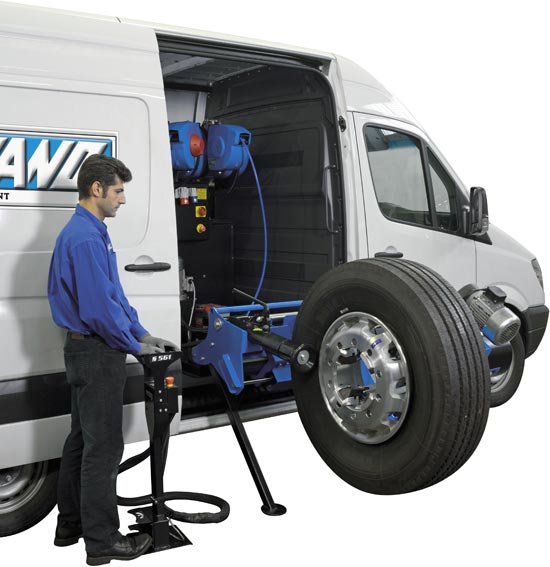Tire Solution: The Influence of Weather Problems
When it involves guaranteeing optimal performance and security when traveling, comprehending the impact of climate condition on tire service is important. From scorching warm to icy roadways, each weather condition component can considerably affect tire functionality and total driving experience. By diving into the results of differing weather condition conditions on tires, drivers can acquire useful understandings that may improve their automobile's efficiency and durability. In this discussion, we will certainly explore the detailed partnership between climate condition and tire solution, clarifying the value of weather-specific tire upkeep methods and factors to consider.
Warm and Tire Performance
When subjected to high temperatures, tires experience changes in performance that can dramatically affect lorry safety and security and handling. The warm generated from prolonged driving or heat problems creates the tire rubber to soften, resulting in lowered step life and increased wear. As the rubber ends up being softer, the tire's grip when driving diminishes, affecting stopping ranges and overall grip. In extreme instances, excessive heat can also create tire blowouts, posturing a severe security risk to the car and its passengers.

Winter Effects
Winter problems can have a substantial effect on tire efficiency and security. As temperature levels decrease, tire rubber can harden, leading to reduced traction on icy or snow-covered roadways. In winter, tires might likewise lose air pressure extra rapidly, which can affect dealing with and gas performance. Additionally, chilly temperature levels can trigger tire sidewalls to tense, increasing the risk of damages from holes or other roadway threats.
To mitigate the results of cool weather on tires, it is essential to consistently check tire stress and inflate them to the maker's suggested levels. Using winter months or all-season tires developed for cold weather condition problems can also enhance traction and grip on icy or snowy roads. Correct tire upkeep, consisting of regular assessments for wear and damages, comes to be a lot more critical throughout colder months to guarantee optimal efficiency and safety and security.
Rainy Issues Influence
Tires with worn-out footsteps are a lot more prone to hydroplaning, where a layer of water constructs up in between the tire and the road surface, leading to loss of traction. To battle this, chauffeurs ought to regularly inspect their tires for ample tread deepness and consider spending in tires particularly made for wet problems.
Additionally, stormy weather condition can likewise decrease exposure, making it testing for chauffeurs to see the roadway ahead clearly (GMC Tire Service). In such problems, it is vital to readjust driving speeds appropriately and preserve a safe complying with distance to enable for sudden quits. Correctly filled with air tires can likewise assist in keeping control on wet roads by offering much better handling and hold
Snow and Tire Security
When driving in snowy conditions, having the best tires can make a substantial difference in security and performance. Winter tires are made with unique rubber substances and step patterns to provide better traction on snow and ice compared to all-season tires.

Additionally, chauffeurs must consider mounting tire chains in severe snowy conditions. Tire chains provide extra grip by gripping the snow and ice, boosting security and control. It is crucial to follow manufacturer guidelines when making use of and installing tire chains to stop damages to the tires and car (GMC Tire Service). By choosing the right tires, maintaining proper rising cost of living, and taking into consideration extra grip aids like tire chains, chauffeurs can improve their safety when navigating snow-covered roads.
Weather-Related Tire Maintenance
When faced with numerous weather condition conditions, correct tire upkeep comes to be a vital element of lorry safety and performance. Weather-related tire upkeep encompasses an array of techniques focused on guaranteeing ideal tire feature and long life in different weather condition scenarios. One key facet of weather-related tire maintenance is tire pressure policy. Changing temperatures can cause tire stress to differ, affecting traction and fuel efficiency. On a regular basis adjusting and inspecting tire stress according to supplier referrals is necessary for safe driving in changing weather condition problems. Furthermore, tire step depth plays a significant duty in taking care of various weather condition elements. Tires with appropriate tread deepness provide better you could check here grasp on damp or icy roadways, minimizing the danger of hydroplaning or skidding. When walk wear reaches a specific depth is important for preserving traction and security in unfavorable weather condition, checking tire step consistently and changing tires. By focusing on weather-related tire upkeep, vehicle drivers can enhance security, improve lorry performance, and extend the life-span of their tires.
Conclusion
Finally, climate condition have a significant influence on tire performance and safety. From heat affecting tire pressure and use to cool weather decreasing traction, it is necessary to take into consideration the weather when preserving and using tires. Stormy conditions can reduce hold and lead to hydroplaning, while snow can enhance the threat of mishaps if tires are not appropriately equipped. Weather-related tire upkeep is important in guaranteeing optimum performance and safety and security on the roads.
In this conversation, we will discover the detailed relationship in between climate conditions and tire service, shedding light on the relevance of weather-specific tire upkeep practices and factors to consider.
